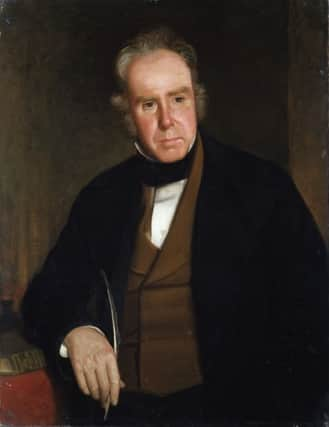Protestant convert who introduced everyday Ireland to English reader


The Protestant convert made a name for himself portraying the routines of typical Irishmen in his stories, and his was an unlikely trajectory in life.
Michael Fisher, one of those organising today’s memorial, described him as the “first significant Irish writer to be recognised in Britain, writing about what we’d call the lives of ordinary people in Ireland, as opposed to in the big house”.
Advertisement
Hide AdAdvertisement
Hide AdCarleton was born into a large Catholic family from a small landholding in Clogher, Co Tyrone in March 1794, according to Mr Fisher.


Educated in hedge schools, in his younger years Carleton was believed to have claimed membership of the Ribbonmen, an anti-Orange rural secret society.
He lived to age 74, and his funeral service was held in a Church of Ireland church in Dublin on January 30, 1869, having switched his religious allegiances in what Frank McNally, writing in the Irish Times, notes may have been “a career move by a talented but ambitious man in search of patronage”.
Mr McNally said that his Protestant conversion may have influenced him to change the facts of the Wildgoose Massacre, an arson/murder incident in Co Louth in which eight people died when a house was burned – possibly by the Ribbonmen.
Advertisement
Hide AdAdvertisement
Hide AdMr McNally wrote that “Carleton cast the central victim of the tragedy as a Protestant – ‘the only Protestant in the parish’. In real-life, the man was just as Catholic as his attackers.”
Mr Fisher, now working as a reporter for the Northern Standard in Monaghan, but formerly with RTE in Belfast, said Carleton was “initially an aspirant to the priesthood” and began working as “a peripatetic teacher” before his writing career took off.
A colloquial slant on Irish life was the main hallmark of his work, and ‘Traits and Stories of the Irish Peasantry’ was his magnum opus.
“Despite the popularity of his stories in America, Carleton did not receive any income from that source in the absence of any copyright laws,” said Mr Fisher, who is 66 and from Monaghan.
Advertisement
Hide AdAdvertisement
Hide Ad“So he needed an income to support his family and in 1847, supporters petitioned the state to grant him a pension. They included the president of Maynooth College, a founder of the Orange Order... Daniel O’Connell’s son, and Oscar Wilde’s father, among others.”
In 1989, money was raised to restore his grave at Mount Jerome Cemetery in Dublin and unveil an obelisk there which read: “Wherein rest the remains of one whose memory needs neither graven stone nor sculptured marble to preserve it from oblivion.”
This is where the members of the William Carleton Society are gathering on Saturday at 12.45pm for a short ceremony.
The William Carleton Society describes itself as a cross-border group which seeks to “use his stories of faction-fighting and sectarianism in 19th century Ireland as the basis for talks and discussions on history and literature and the lessons for modern society”.
On February 15, a talk on his life and times will be held in Ranfurly House (Hill of the O’Neill visitor centre), Dungannon, at 7.30pm. Tickets are £3.